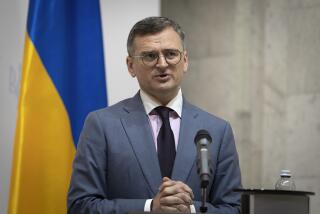Putin assumes new post as leadership transition begins
- Share via
MOSCOW — Former President Vladimir Putin was appointed Russia’s new prime minister Thursday, securing a new place in power a day after leaving the Kremlin. His appointment was the final stroke in a precisely choreographed transition that allows the former KGB officer to leave the Kremlin without completely relinquishing authority.
Forced out of the presidency by constitutional term limits, Putin on Wednesday handed off his title to Dmitry Medvedev, a longtime protege, who in turn nominated his old boss as prime minister.
Since he anointed his successor, Putin has hovered at Medvedev’s side during meetings and public appearances. Both men have said that they planned to run the country as a cooperative project.
“All the previous years we’ve been working together, and we’ll continue to work together,” Medvedev told the lower house of parliament Thursday. “There’s no doubt that our tandem, our cooperation, will only grow stronger.”
Later in the day, Russia announced that it was expelling two American military attaches who worked at the U.S. Embassy here, the State Department said.
The expulsion put an antagonistic start to this new administration, feeding into the questions hanging over Russia’s leaders. But it was not clear who ordered the expulsion, or why it was timed on Medvedev’s first full day in office. Russian officials had no comment.
The action was the latest in an exchange of diplomatic expulsions in which two Russians and three Americans have been sent home since November.
Sean McCormack, the chief State Department spokesman, said there were no plans for a response and refused to say whether the expulsions were connected. But Defense Secretary Robert M. Gates said at a separate briefing that “reciprocity” probably played a role.
“There are some intriguing developments in Moscow,” Gates said. “But I don’t read much into the attache thing other than just the usual tit-for-tat.”
Some analysts had predicted that Medvedev would emerge as a more liberal and pro-Western ruler than Putin, who has sparred vigorously with the United States, Europe and some of the former Soviet republics. Others dismissed Medvedev as a puppet who will mask Putin’s continuing rule.
But Medvedev is in a more powerful position now than is his mentor.
And in a country where the tradition of a single, dominant ruler is deeply ingrained, many are wondering whether the men will clash as Medvedev strives to take charge.
Speaking Thursday before the State Duma, or lower house, Putin stuck carefully to the domestic, bread-and-butter issues that have traditionally been tended by the prime minister. The lawmakers listened attentively, bursting regularly into applause, as Putin gave a lengthy, forceful list of social and economic policy suggestions, ranging from anti-drinking programs to lowering the inflation rate to tax cuts for the oil sector.
Afterward, the lawmakers voted, 392-56, to approve Putin’s appointment. Only the Communists did not back the former president.
Putin’s nomination was never in doubt. His party, United Russia, holds more than three-quarters of the Duma seats. Thursday’s debate was the final, theatrical exercise in the long-guaranteed ascension to the job he chose for himself.
Under Putin’s centralized rule, the prime minister’s position remained relatively toothless and largely bureaucratic. But many Russians are skeptical that Putin will be willing to stay in the shadows while Medvedev sits in the country’s most powerful office.
Putin is expected to appoint a government in coming days, and has said that he plans to increase the number of deputy prime ministers.
--
Times staff writers Paul Richter and Julian E. Barnes in Washington contributed to this report.
More to Read
Sign up for Essential California
The most important California stories and recommendations in your inbox every morning.
You may occasionally receive promotional content from the Los Angeles Times.













